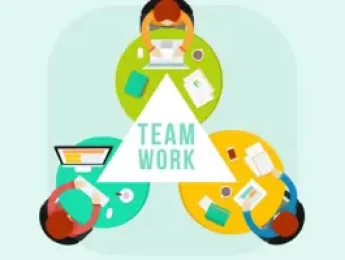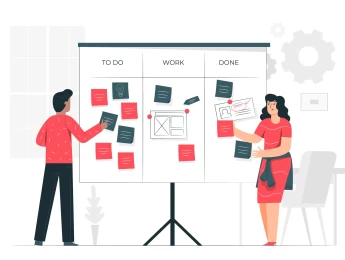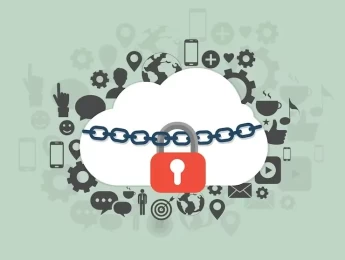New managers need a diverse set of essential skills to navigate the complexities of leadership effectively. Effective communication is crucial as it fosters a transparent and collaborative work environment, ensuring that expectations are clear and feedback is constructive. Additionally, strong interpersonal skills are vital for building positive relationships with team members and fostering a supportive team culture.
Time management and organisational skills help new managers prioritise tasks, meet deadlines, and ensure the efficient flow of operations. Decision-making abilities and problem-solving skills enable managers to address challenges promptly and make informed choices.
Adaptability is also essential for navigating change and handling unexpected situations, while empathy fosters a deeper understanding of team dynamics and individual needs. Finally, a commitment to ongoing learning and development ensures new managers stay abreast of industry trends and continually refine their leadership approach.
Upon completion of this course, participants will be able to:
- Acquire and develop crucial skills for new managerial roles.
- Understand and apply strategic thinking in management practices.
- Learn effective goal-setting and planning techniques.
- Cultivate the ability to prioritise customer focus in management.
- Develop positive interpersonal techniques for fostering better relationships with team members.
- Gain a thorough understanding of managerial roles and responsibilities.
- Improve communication within the team and set clear expectations for both yourself and direct reports.
- Adapt leadership styles to meet the unique needs of individual team members.
- Effectively communicate organisational goals to achieve tangible results.
- Implement delegation strategies to enhance productivity and motivation.
- Use effective coaching techniques to optimise team performance.
This course is designed for anyone responsible for managing a team in any industry. It would be most beneficial for:
- Business Owners
- Aspiring Managers
- Team Managers
- Supervisors
- Current Managers
- HR Professionals
- Coaches
This course uses a variety of adult learning styles to aid full understanding and comprehension. Participants will view videos to understand the best practices in line management. They will undergo role-playing activities to understand how to deal with difficult conversations and work together to overcome common challenges.
They will devise motivational plans and projects to keep their teams on board and learn about different communication techniques to gain buy-in and enhance performance.
Day 5 of each course is reserved for a Q&A session, which may occur off-site. For 10-day courses, this also applies to day 10
Section 1: Responsibilities as a New Manager
- Effective communication in management.
- Team building and leadership skills.
- Time management for new managers.
- Conflict resolution in a managerial role.
- Performance feedback and appraisal techniques.
- Understanding and implementing company policies.
- Decision-making and problem-solving for managers.
- Managing work-life balance for yourself and your team.
- Developing a positive and productive work culture.
- Legal and ethical responsibilities of a manager.
Section 2 : Managing Performance
- Setting and communicating performance expectations.
- Conducting effective performance reviews.
- Goal setting and performance metrics.
- Providing constructive feedback and recognition.
- Addressing underperformance and implementing improvement plans.
- Balancing individual and team performance.
- Utilising performance management tools and technology.
- Employee development and career planning.
- Handling difficult performance-related conversations.
- Continuous improvement strategies in performance management.
Section 3 : Communication Techniques
- Effective verbal communication skills.
- Written communication for clarity and impact.
- Non-verbal communication and body language.
- Active listening techniques.
- Tailoring communication to diverse audiences.
- Managing communication in virtual or remote settings.
- Constructive feedback and constructive criticism.
- Conflict resolution through effective communication.
- Building rapport and positive relationships.
- Public speaking and presentation skills.
Section 4: Utilising Varied Leadership Styles
- Adapting leadership styles to situations.
- Transformational leadership techniques.
- Situational leadership for effective decision-making.
- Collaborative and inclusive leadership approaches.
- Leading diverse and cross-functional teams.
- Emotional intelligence in leadership.
- Coaching and mentoring as leadership styles.
- Balancing authority and empowerment in leadership.
- Assessing and developing your personal leadership style.
Section 5: Care & Influence in Management
- Cultivating a caring and empathetic managerial approach.
- The impact of emotional intelligence on leadership.
- Building trust and rapport with your team.
- Balancing empathy and authority in management.
- Influencing skills for effective leadership.
- Motivating and inspiring team members.
- Navigating power dynamics with care and integrity.
- Developing a culture of support and well-being.
- Leveraging influence to drive positive change.
- Ethical considerations in managerial decision-making.
Section 6: Coaching to Improve Performance
- Providing constructive feedback in a coaching context.
- Building a coaching relationship with team members.
- Identifying and addressing performance gaps through coaching.
- Creating and implementing personalised improvement plans.
- Monitoring progress and adjusting coaching strategies.
- Overcoming challenges in coaching for performance improvement.
- Integrating coaching into a holistic performance management approach.
Section 7 : Managing Difficult Conversations
- Active listening and empathy in challenging dialogues.
- Constructive communication during tough discussions.
- Dealing with resistance and defensiveness.
- Strategies for maintaining composure and professionalism.
- Addressing sensitive topics with cultural awareness.
- Building rapport and trust in difficult conversations.
- Conflict resolution techniques in managerial discussions.
- Follow-up and support after challenging interactions.
Upon successful completion of this training course, delegates will be awarded a Holistique Training Certificate of Completion. For those who attend and complete the online training course, a Holistique Training e-Certificate will be provided.
Holistique Training Certificates are accredited by the British Assessment Council (BAC) and The CPD Certification Service (CPD), and are certified under ISO 9001, ISO 21001, and ISO 29993 standards.
CPD credits for this course are granted by our Certificates and will be reflected on the Holistique Training Certificate of Completion. In accordance with the standards of The CPD Certification Service, one CPD credit is awarded per hour of course attendance. A maximum of 50 CPD credits can be claimed for any single course we currently offer.
- Course Code MG2-177
- Course Format Classroom, Online,
- Duration 5 days














